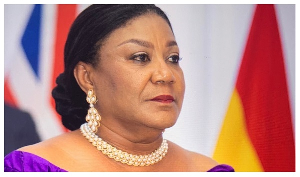The Bank of Ghana has embarked on an intensive exercise to issue final warning to companies and other organisations pricing and/or trading in foreign currency.
The central bank in July 2019 issued a notice reminding businesses and other institutions of the Foreign Exchange Act, 2006 (Act 723) which prohibits the pricing, advertising and receipt or payment for goods and services in foreign currency; warning that violation of the law may result in summary conviction, a fine of up to 700 penalty units or a prison term of not more than 18 months, or both.
However, some companies, especially hotels, international schools, and supermarkets have disregarded this directive and continue to trade in foreign currency, a situation that has partly been responsible for the weakening of the cedi over the years.
To show such organisations that the bank takes such violations seriously, a team from the central bank, together with the media paid unannounced visits to two supermarkets in Accra suspected to be accepting foreign currency as a means of exchange.
The Palace Supermarket on the Spintex Road was first to be visited. When the team from BoG and the media spoke to the Finance Manager, Aaron John, he admitted that his outfit accepts foreign currency but promised to put a stop to it once they have received a caution from the regulator.
“We want to support government and Bank of Ghana not to accept dollars from our customers. They have educated us on the law and we are ready to obey them. We urge our customers to change their monies at the forex bureau before they come to buy from here,” he said.
However, when the inspection team got to the Koala Shopping Mall at Cantonments, Accra, the shop manager was unwilling to cooperate with the Bank of Ghana staff’s request for him to accept one of the notice and paste it where customers will see; giving reason that he can only accept with the permission of head office.
Speaking to the media after the exercise, Head of Communications at the Bank of Ghana, Esi Hammond, cautioned businesses to refrain from violating the forex law, as the regulator sees this exercise as both a warning and sensitisation to educate businesses doing so.
“We want to engage our stakeholders to alert them about on the need to observe the rules and regulations relating to the Foreign Exchange Act which prohibits the pricing of goods in foreign currency. It has come to our notice that a few shops and even schools charge in dollars.
So today we paid a visit to the palace supermarket because initially we did a few shopping around and realised that some of the shops take dollars in exchange of goods so we had to engage them and let them know it contravenes the Act.
They have promised they are not going to do the dollar business anymore. And we will continue to do this in various institutions. Some of them claim they are not aware of the law but that cannot be true. We need to signal to people that it is against the law; we need to deal only in our local currency,” she said.
She however warned that organisations which continue to flagrantly disregard this law would soon face the penalties associated with it.
Click to view details



Business News of Thursday, 27 February 2020
Source: thebftonline.com

















